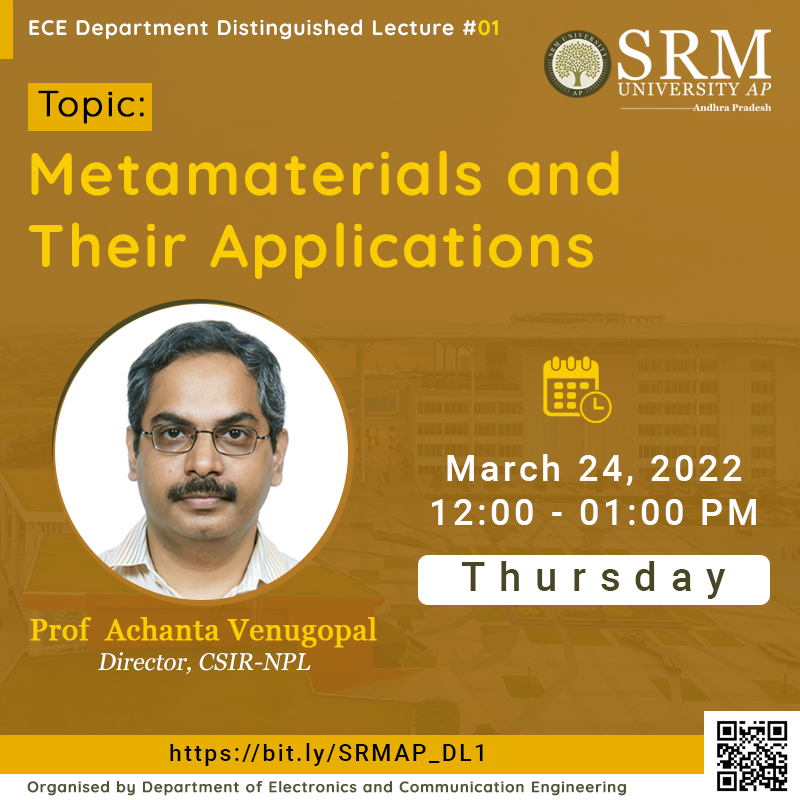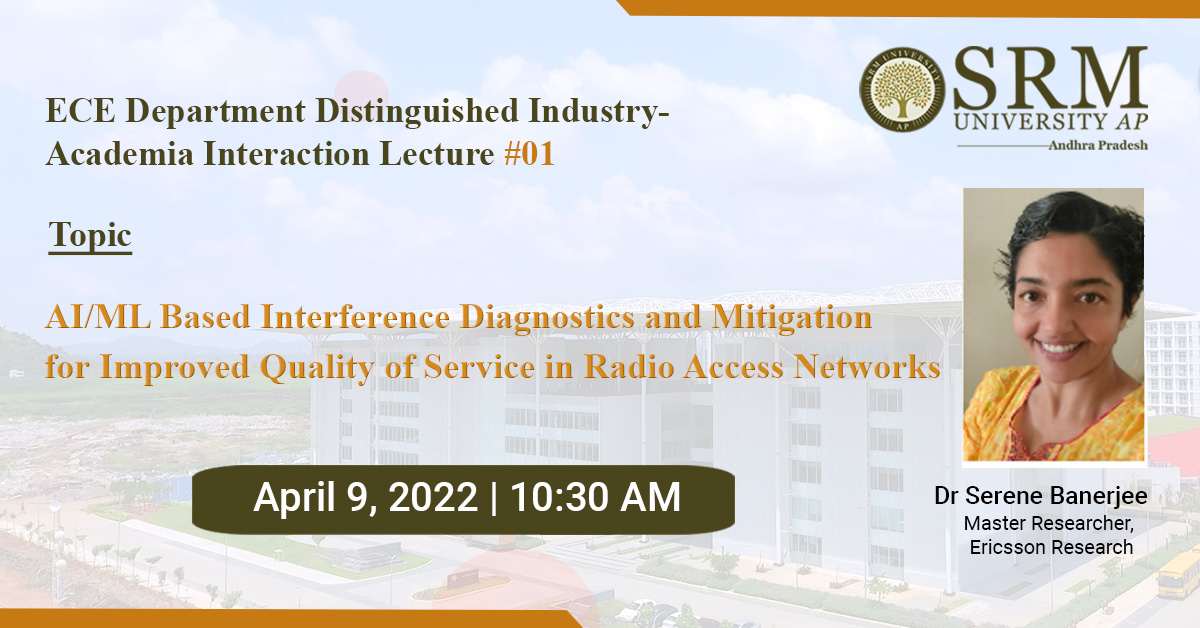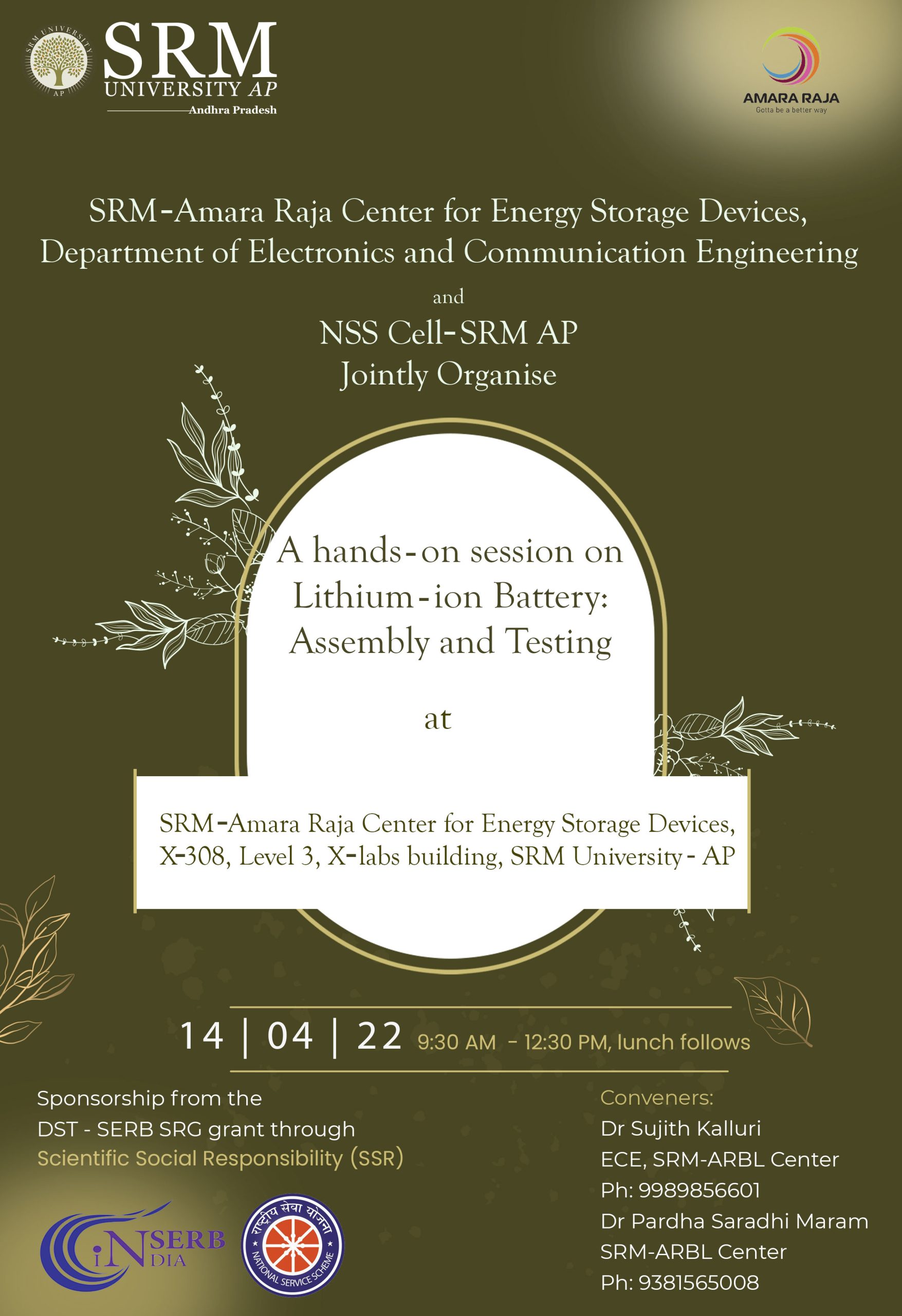Photonic crystals-based DWDM devices for optical networking applications
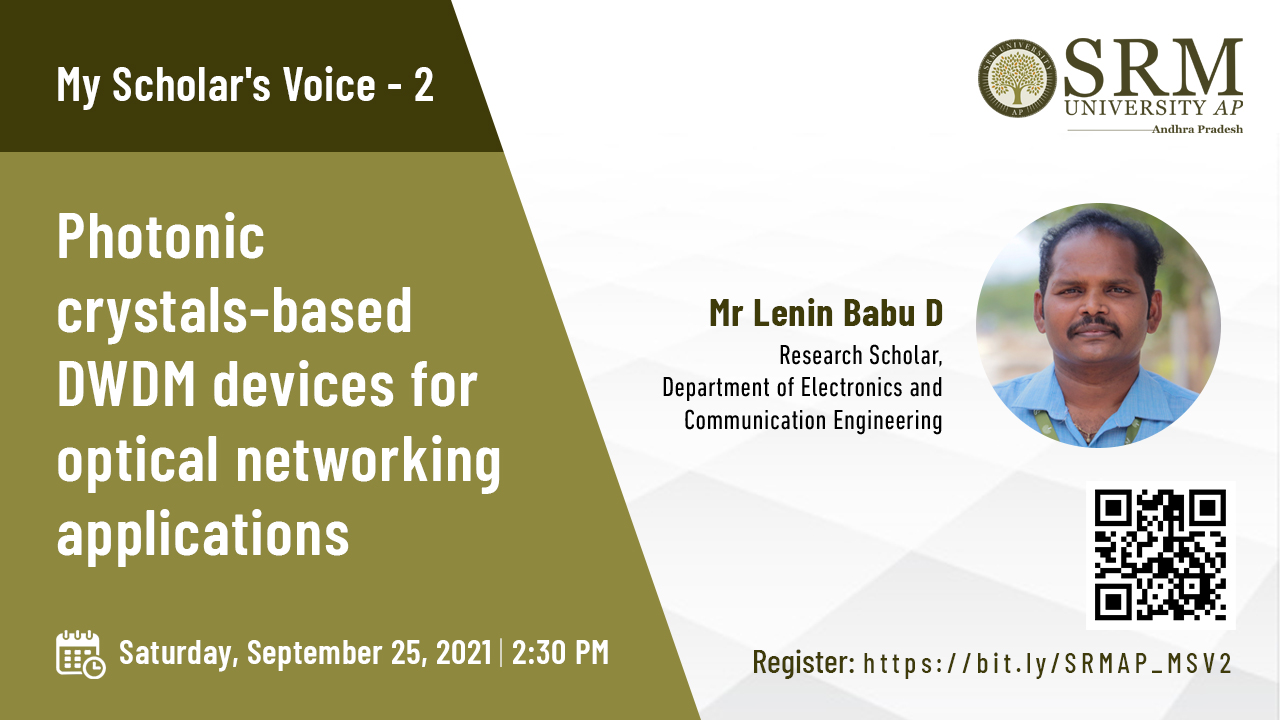 The research scholars from the Department of Electronics and Communication Engineering with great support and supervision from the faculty have planned to conduct their second Research Scholar’s Talk Series MSV-II on 25 September 2021 at 02:30 pm. Mr D Lenin Babu will engage the participants from 11:00 am to 12:00 pm with his enlightened talk on Photonic crystals-based DWDM devices for optical networking applications.
The research scholars from the Department of Electronics and Communication Engineering with great support and supervision from the faculty have planned to conduct their second Research Scholar’s Talk Series MSV-II on 25 September 2021 at 02:30 pm. Mr D Lenin Babu will engage the participants from 11:00 am to 12:00 pm with his enlightened talk on Photonic crystals-based DWDM devices for optical networking applications.
About the Speaker:
Mr D Lenin Babu is pursuing his PhD under the guidance of Dr Sreenivasulu (Department of ECE, SRM University-AP). He received his B Tech degree in ECE from JNTU Kakinada and received his MTech with specialization in Embedded systems from Vignan University in 2015. His research interests include integrated optical devices for optical communication systems. He is working towards his thesis titled “Photonic crystals based DWDM devices for optical networking applications”.
Join this engaging webinar on 25 September 2021, at 02.30 pm to learn more about photonic crystals-based DWDM devices for optical networking applications!
- Published in Departmental Events, ECE Events, Events, Research Events, Research Webinars
Recent Trends in Microwave and Beyond Techniques
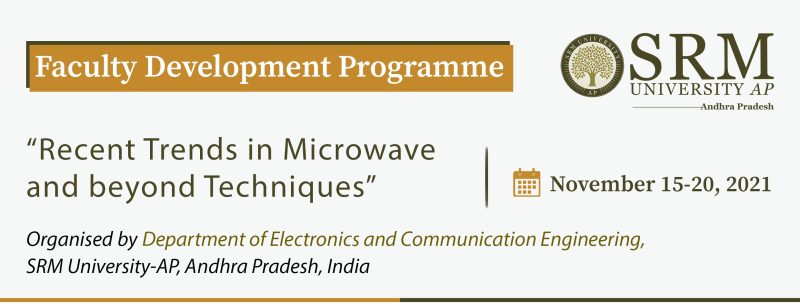 SRM University-AP, is pleased to announce that the Department of Electronics and Communications Engineering is bringing forth a Faculty Development Programme (FDP) on “Recent Trends in Microwave and Beyond Techniques”. The duration of the program duration is November 15, 2021 to November 20, 2021. The sessions are scheduled in the afternoon from 2:00 to 5:00 p.m., Tuesday to Friday and in Forenoon from 10:00 a.m. to 12:00 p.m. on Saturday.
SRM University-AP, is pleased to announce that the Department of Electronics and Communications Engineering is bringing forth a Faculty Development Programme (FDP) on “Recent Trends in Microwave and Beyond Techniques”. The duration of the program duration is November 15, 2021 to November 20, 2021. The sessions are scheduled in the afternoon from 2:00 to 5:00 p.m., Tuesday to Friday and in Forenoon from 10:00 a.m. to 12:00 p.m. on Saturday.
This is a 6-day online Faculty Development Programme aimed to enhance research capabilities of the researchers and professionals working in RF/ Microwave, Millimetre Waves, 5G communication and Metamaterial domain. Eminent Scientists and professors from highly reputed institutes will share their research experience with budding researchers, and expert from industries will offers Hands on Sessions. This Program will be managed by the Faculties of Department of ECE, SRM-AP.
* There is no registration fee for this FDP program. The certificate will be provided to all the attendees of this program. The candidates can register for this program on the link given below.
Register here.
The programme will cover a wide range of topics such as
- Space exploration and technical challenges in Mars Landing
- High-performance Microwave and Millimetre Wave Components Utilizing Suspended Substrate Transmission Line
- Metamaterials
- RF Energy Harvesting
- Microwave Amplifiers/Microwave absorbers
- 5G Beam forming Techniques/5G Antenna Implementation and challenges
- Characteristic Mode Approach to Antenna and Array analysis
- FSS for Aerospace applications: radome and antenna
- Dielectric Resonator Antennas for Futuristic Applications
- Near and Far-Field Wireless Power Transfer: Trends, Techniques and Recent Developments
Some of the eminent speakers in this program will be
- Dr Goutam Chattopadhyay (NASA-Jet Propulsion Laboratory, California Institute of Technology)
- Prof. S.K. Koul (CARE, IIT Delhi)
- Dr Arokiaswami Alphones (School of Electrical and Electronic Engineering, NTU Singapore)
- Prof. V. Subramanian (Dept. of Physics, IIT Madras)
- Dr Mrinal Kanti Mandal (IIT Kharagpur)
- Dr Chinmoy Saha (Dept. of Space, IIST Thiruvananthapuram)
- Dr Arani Ali Khan (Dept. of Electrical Engg., IIT Jodhpur)
- Dr Debdeep Sarkar (Dept. of Electrical Commu., IISC Banglore)
- Dr Saptrishi Ghosh (Dept. of Electrical Engg., IIT Indore)
- Dr Shiv Narayan (NAL Banglore)
- Mr Sandeep Ghoshal (Maths work)
- Dr Ravi Dutt Gupta (Ace Technologies)
- Swapnil Gaul (Founder – NUMEREGION)
- Sumith S. Pillai (EMAG Solution Engineer, CST Microwave studio, VIAS pvt. ltd.)
This programme is being conducted under the watchful and dedicated eyes of Dr Divya Chaturvedi, Dr Goutam Rana, and Dr Ramesh Vaddi, from the Department of Electronics and Communications Engineering.
We invite faculty members from Indian and International institutes, research scholars, undergraduate and post-graduate students to become a part of an interesting and illuminating session which will have speakers from various teaching and professional fields to contribute their theoretical and practical insights.
This program will be especially helpful to the participants who are doing or planning to start research career in RF/Microwave-Millimetre wave domains. The recordings of the sessions will be provided to all attendees. The certificate of participation will also be provided to all the participants.
Register here.
- Published in Departmental Events, ECE Events, Events
MSV-IV with Shaik Rajak
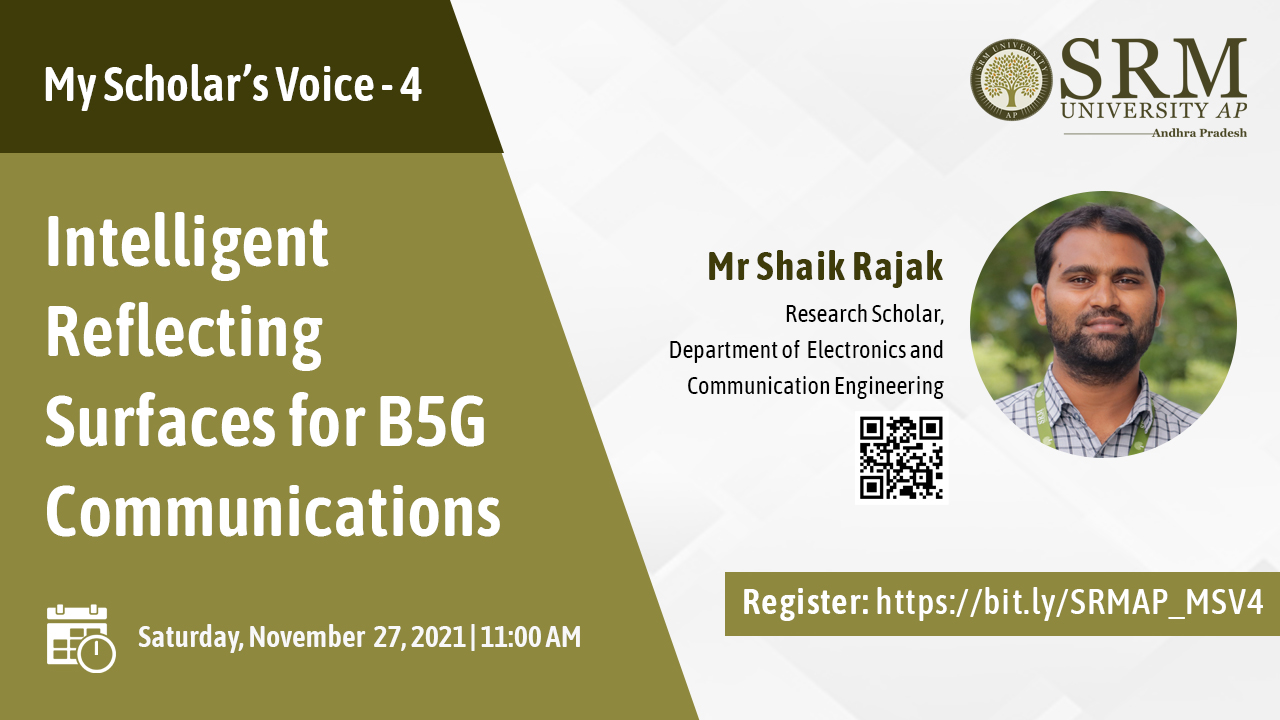 The world of communications is constantly changing. It is transforming, evolving, and becoming better, faster, and smarter. So, for the fourth edition of My Scholar’s Voice (MSV-IV) we would like to present Shaik Rajak from the Department of Electronics and Communications Engineering for a titillating discussion on “Intelligent Reflecting Surfaces for B5G Communications” on Saturday, November 27, 2021, at 11.00 am.
The world of communications is constantly changing. It is transforming, evolving, and becoming better, faster, and smarter. So, for the fourth edition of My Scholar’s Voice (MSV-IV) we would like to present Shaik Rajak from the Department of Electronics and Communications Engineering for a titillating discussion on “Intelligent Reflecting Surfaces for B5G Communications” on Saturday, November 27, 2021, at 11.00 am.
Shaik Rajak will give us an insight into the future with communications with his talk. He will elaborate in this session on the importance of his research. He will talk about the scopes of implementation as well as further research that can follow his work. It would be really beneficial to learn about the developing phase of communication research to make an informed decision while choosing research or career plans.
About the speaker:
Shaik Rajak received his B. Tech degree in Electronics and Communication Engineering from JNTU, Hyderabad in 2013. He completed his M.Tech. in Electronics and Communication Engineering, JNTU Hyderabad in 2016 and is currently working towards the PhD at the School of Engineering And Science (SEAS), SRM University-AP, Andhra Pradesh, India. Before joining SRM University-AP, he worked as a lecturer for a year in QIS College of Engineering and Technology (QISCET), Andhra Pradesh. He was awarded a gold medal for the paper presentation organized by SRM University-AP. His current research interests include the Internet of Things, beyond 5G communications, Intelligent Reflecting Surfaces, Millimeter-wave, Massive MIMO, OMA, and NOMA schemes.
So, take a seat and be a part of this amazing session on Saturday, November 27, 2021, at 11.00 am to hear from Shaik Rajak’s voice in MSV-IV.
- Published in Departmental Events, ECE Events, Events
Metamaterials and their applications: Distinguished Lecture Series
The Department of Electronics and Communication Engineering is hosting the first segment of the ECE Department Distinguished Lecture Series on March 24, 2022, from 12.00 pm to 01.00 pm IST. Prof Achanta Venugopal, Director, CSIR-NPL is the distinguished speaker of the event. He will be delivering a talk on the topic “Metamaterials and their Applications”.
Abstract of the Talk
Metamaterials are designed materials with unique properties that may not exist in naturally available materials. These are designed with sub-wavelength size components. In this talk, after briefly introducing metamaterials, the speaker will discuss on a few metal-dielectric and all dielectric metamaterials and their applications in wide-ranging areas covering stealth, single-photon emitters, reusable biosensors among others.
Speaker’s Profile
Venu Gopal Achanta obtained his PhD in Physics from Tata Institute of Fundamental Research, Mumbai and PhD in Electronics from Tokyo University, Tokyo, Japan. He is currently the Director of CSIR-National Physical Laboratory, Delhi. He is on lien from Tata Institute of Fundamental Research, Mumbai where he is a professor in the Department of Condensed Matter Physics and Material Science. He has served in various TIFR committees as chair and member. He is also on the senates of IISER, Berhampur and IIT, Delhi. He is a member of the executive council of Optical Society of India, vice-chair of IEEE Photonics Mumbai chapter and member of the program committee of the Association of Asia Pacific Physics Societies – Division of Condensed Matter Physics. He is on the editorial board of journals, Scientific Reports, Frontiers in Physics, Encyclopedia of Applied Physics, and the Indian Journal of Pure and Applied Physics. He is an honorary Fellow of the Metrology Society of India and senior member of IEEE. His research interests are in nano and quantum photonics with over 140 journal publications.
Join here for an insightful session with Prof Achanta Venugopal.
- Published in Departmental Events, ECE Events, Events, Webinars
AI/ML algorithms for radio access networks
The Department of Electronics and Communication Engineering is hosting the first instalment of the Distinguished Industry-Academia Interaction Lecture in the ECE DDIAL series. The event is scheduled on April 9, 2022, at 10.30 am. Dr. Serene Banerjee, Master Researcher, Ericsson Research, will be the keynote speaker. She will deliver a talk on the topic ‘AI/ML Based Interference Diagnostics and Mitigation for Improved Quality of Service in Radio Access Networks’.
Abstract of the Talk
For coverage and capacity optimization, Uplink Power Control is one of the key steps, in addition to antenna tilting and Downlink Power Control. For self-organizing networks, automated algorithms for Uplink Power Control are a necessity. However, Uplink Power Control affects the noise in the neighbouring cells. It is important to detect this interference to monitor uplink noise. Uplink noise due to power control manifests as static interference in the channel. The current state-of-the-art baseline model is based on regression models. We have proposed automated detection of static interference in the uplink channel of cells based on machine learning models. We have evaluated the same on customer data on LTE networks with high accuracy. The detected cells are subsequently used to correct the nominal power parameter through a proposed teacher-student model based on the primary cell and its neighbours. This approach shows better performance than the state-of-the-art baseline methods. The dual of static is dynamic interferences and can be attributed to traffic load, Passive Intermodulation (PIM) and thermal noise, etc. PIM identification is a major component in troubleshooting modern wireless communication systems. The introduction of carrier aggregation has increased PIM occurrences. Current state-of-the-art approaches include manual rule-based and hardware-based debugging. These approaches can detect the occurrence of PIM, long after the event occurrence and result in incurring incidental costs. We propose an ensemble of time series-based machine learning and signal processing approaches that can automatically identify PIM in real-time by analyzing Key Performance Indicators (KPI) of the primary cell and its nearest neighbours. We validate our results for various environmental conditions in data available from LTE and 5G consumer networks. We have further extended the work to multi-frequency time series to handle finer time granularities and detect PIM anomalies in an online learning setting. We further propose a self-supervised reinforcement learning approach to predict PIM related anomalies before it happens. We forecast environmental conditions that give rise to PIM based on offline historical data and model to predict future occurrences. Experimental results are on real-world datasets comprising 50,000+ cells which have shown to accurately predict PIM 60% of the time. To the best of our knowledge, this is the first work, where we are able to predict PIM anomalies before they happen. Post PIM-identification, we propose a binary search-based solution that is amenable to real-time implementation. We show through simulations that this search in tandem with a reinforcement learning-based solution can dynamically mitigate and cancel PIM. Results show that the number of steps to converge, to identify and mitigate the PIM in uplink frequency is reduced by a large factor. To summarize, our contributions include using machine learning algorithms for: (1) robust interference classification, (2) demonstrating p0-nominal recommender as teacher-student model, (3) a times-series analysis-based PIM identification, (4) extending the approach to multi-frequency time series, and for online learning, (5) demonstrating a self-supervised reinforcement learning approach to predict PIM anomalies before they happen, and (6) mitigating PIM, in spite of environmental unknowns, by employing binary search in conjunction with ML/RL-based approaches.
About the Speaker
Serene Banerjee, Master Researcher, Ericsson Research, has 17+ years of industrial experience after completing her PhD from the University of Texas at Austin, under Prof Brian L Evans in 2004. She has completed BTech(H) in Electronics and Electrical Communications Engineering from IIT Kharagpur in 1999. At Ericsson, she is focusing on developing AI/ML algorithms for Radio Access Networks. Prior to Ericsson, she has worked with Texas Instruments, HP, and Johnson Controls. She has 23 peer-reviewed publications, 9 granted patents, and several pending.
Join the webinar for an informative interaction with Dr Serene Banerjee.
- Published in Departmental Events, ECE Events, Events
A hands-on session on lithium-ion battery: assembly and testing
Allowing students to explore more into their learning domain will invariably enhance their quest for knowledge. The more students are encouraged to experiment with problems, tools, and substances they will work with, the better prepared they are to face any challenge head-on. It is also a better rewarding alternative as against the conventional book learning method.
Taking the current scenario into account,imparting hands-on training on cutting-edge developments is an excellent exercise to inculcate scientific spirit in young minds. Such initiatives should be actively promoted to equip students on par with the fast-evolving technological realm. We are delighted to announce that the SRM-Amara Raja Center for Energy Storage Devices, Department of Electronics and Communication Engineering, collaborates with NSS Cell-SRM AP to organise a “Hands-on Session on Lithium-ion Battery: Assembly and Testing” with the sponsorship from the DST-SERB Start-up Research Grant (SRG).
Date: April 14, 2022
Time: 9.30 am to 12.30 pm IST
We invite all the interested students to become part of this invigorating initiative and make the best use of this opportunity to receive an enriching training session. The event is also followed by lunch for all the participants.
- Published in Departmental Events, ECE Events, Events
Ultra-low power and agile IC design for novel sensor nodes for the Internet of Things
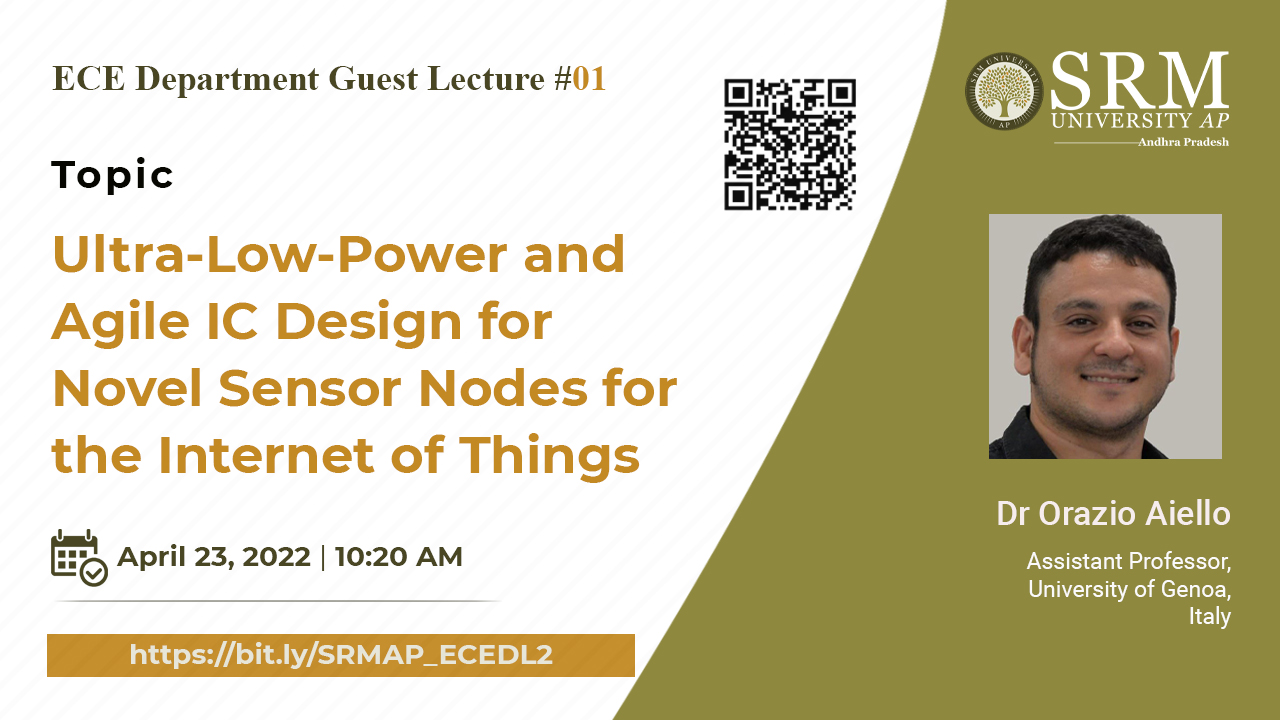
The Internet of Things (IoT) has greatly increased our awareness of the world and broadened the scope of our engagement with it. In the first episode of the ECE Department Guest Lecture Series, the Department of Electronics and Communication Engineering at SRM University-AP is organising a lecture on April 23, 2022, from 10.20 am to 12.00 noon. Dr Orazio Aiello, Assistant Professor at the University of Genoa, Italy, will engage the audience on the topic Ultra-Low-Power and Agile IC Design for novel Sensor Nodes for the Internet of Things on that day.
The vision of a world where pervasive integrated electronic systems embedded in everyday life objects (e.g. household appliances, surveillance cameras, healthcare systems) are fully interconnected to collect, process, and exchange useful information requires energy-autonomous systems for distributed sensing and data acquisition. The low-cost requirement demands a small area, low design effort, digital-like shrinkage across CMOS generations, and design/technology portability. The possibility to exploit the digital (automated) design flow even for analog building blocks can dramatically reduce the design effort of any system-on-chip that faces the analog signal. Since data processing is digital, but most signals from the real world are analog, almost any electronic device that interfaces with the surrounding environment will benefit from the outcomes of this investigation. In this framework, the talk illustrates the concepts and the design flows which enable the implementation of analog functions by true digital circuits.
Biography of the speaker:
Orazio Aiello (Senior Member, IEEE) received the BSc and MSc degrees (cum laude) from the University of Catania, Italy, in 2005 and 2008, respectively, the M.Sc. degree (cum laude) from the Scuola Superiore di Catania, Italy, in 2009, and the PhD degree from the Politecnico di Torino, Italy, in 2013.,From 2008 to 2009, he was an Analog IC Designer and an EMC Consultant for STMicroelectronics, Castelletto, Italy. In 2012, he was a Visiting PhD. A student with Monash University, Melbourne, Australia. In 2013, he was a Research Fellow in a joint project with FIAT-Chrysler Automobiles, Turin. In 2014, he joined NXP-Semiconductors, Nijmegen, The Netherlands, as a Mixed Signal IC Designer and an EMC Expert. In 2015 and 2016, he was a Visiting Fellow with the University of Sydney and the University of New South Wales, Sydney, Australia. Since 2015, he has been working with the Green IC Group, Department of Electronics and Communication Engineering (ECE), National University of Singapore, where he has also been a Marie Skłodowska-Curie Individual and a Global Fellow leading the ULPIoT project. He is now an Assistant Professor at the University of Genova, Italy. His main research interests include energy-efficient analogue-mixed signal circuits and sensor interfaces. Dr Aiello is a member of the IEEE CASS Microlearning AdHoc Committee and is/was a Technical Program Committee Member of a number of conferences, such as NORCAS and APCCAS.
Join this informative lecture with Dr Orazio Aiello on April 23, 2022 at 10.20 am IST.
- Published in Departmental Events, ECE Events, Events, Webinars
Engineering and research challenges in building smart cameras
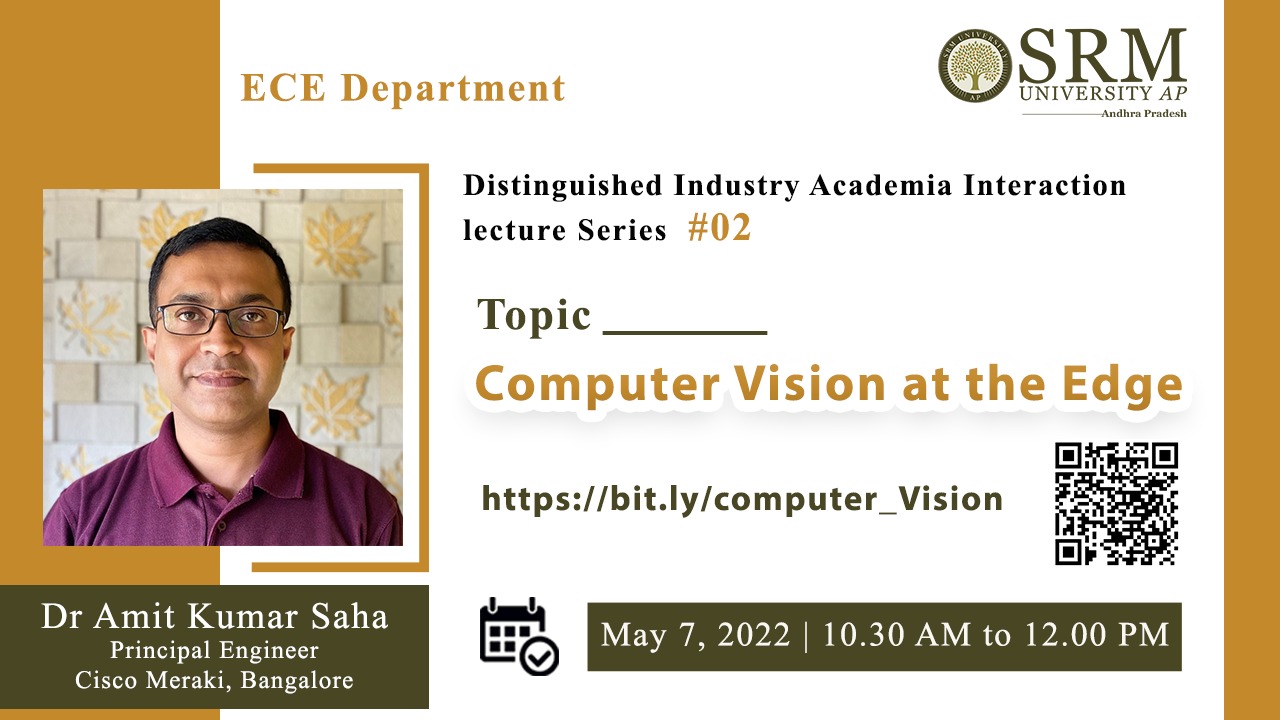 Machine Learning has started its move from the cloud to the periphery of the network. Today’s edge devices are becoming smarter and are no longer the dumb devices that would simply transmit the data to some central location. The Department of Electronics and Communication Engineering is conducting the 2nd department distinguished Industry-Academia Interaction lecture in the ECE DDIAIL series. Dr Amit Kumar Saha, Principal Engineer at Cisco Meraki, Bangalore, will deliver a talk on the topic ‘Computer vision at the edge’.
Machine Learning has started its move from the cloud to the periphery of the network. Today’s edge devices are becoming smarter and are no longer the dumb devices that would simply transmit the data to some central location. The Department of Electronics and Communication Engineering is conducting the 2nd department distinguished Industry-Academia Interaction lecture in the ECE DDIAIL series. Dr Amit Kumar Saha, Principal Engineer at Cisco Meraki, Bangalore, will deliver a talk on the topic ‘Computer vision at the edge’.
The talk will focus on the evolution of a specific type of edge device, the surveillance camera, from the traditional CCTV model to the smart camera model. It will discuss some of the engineering and research challenges in building smart cameras that lie at the periphery of the network.
Date: May 7, 2022
Time: 10.30 am to 12.00 pm IST
About the speaker
Dr Amit Kumar Saha is the Principal Engineer at Cisco Meraki, Bangalore. He received his PhD degree from Rice University in 2007. Prior to that, he obtained his BTech degree from IIT Kharagpur as a recipient of Dr B C Roy Gold Medal in 1999 for being the single graduating student with the best mix of academics and extracurricular activities. Dr Amit explores the next generation of technology at the intersection of networks, distributed systems, and data science, with a special emphasis on system-wide design. He is part of Cisco Meraki’s Camera Intelligence team and enables Cisco’s internal products as well as customers better manage their AI/ML life cycles by making it easier to train and tune models and deploy distributed machine learning workloads. He passionately seeks out opportunities to give back to the community through talks, research collaborations, organising conferences, and as visiting faculty at several top institutes in India.
Join the webinar and learn from industry professionals
- Published in Departmental Events, ECE Events, Events, Webinars
Faculty Development Programme on Optical Communication and Wireless Networks
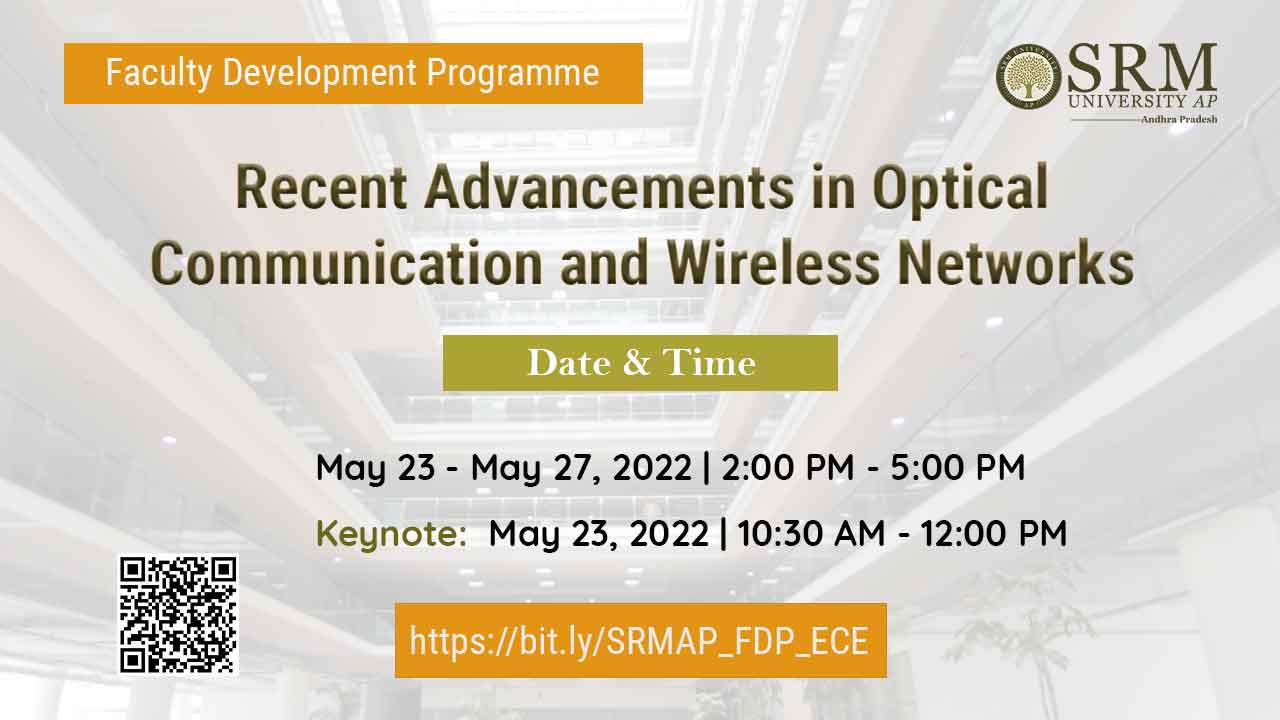 SRM University AP is delighted to announce the Faculty Development Programme on Recent advancements in optical communication and wireless networks. The session is scheduled from May 23 to 27, 2022. The programme will be managed by the faculties of the Department of Electronics and Communication Engineering. This five-day hybrid programme aims to enhance research capabilities mainly for the researchers and professionals working in Free Space Optics and Advanced Wireless Communication Networks. Eminent scientists and professors from highly reputed institutes are invited to share their research experiences.
SRM University AP is delighted to announce the Faculty Development Programme on Recent advancements in optical communication and wireless networks. The session is scheduled from May 23 to 27, 2022. The programme will be managed by the faculties of the Department of Electronics and Communication Engineering. This five-day hybrid programme aims to enhance research capabilities mainly for the researchers and professionals working in Free Space Optics and Advanced Wireless Communication Networks. Eminent scientists and professors from highly reputed institutes are invited to share their research experiences.
On the first day of the session, the keynote speaker, Professor M.S Alouini, KAUST, Saudi Arabia, will handle a session on Towards Connecting the Remaining 3 + Billion from 10.30 am to 12.00 pm. The FDP targets faculties from Abroad and Indian Institutes, Research scholars, Postgraduate and Undergraduate students. The sessions will be beneficial to those participants who are doing or planning to start a research career in optical/wireless communication network domains.
A wide variety of topics will be discussed during the five-day program. Visible light communication, Optical Imaging and Holography, Computational Optical Sensing and Imaging, VLC for IoT Networks, Terahertz Photonics for Wireless Communications, Deep learning for Wireless Networks, Intelligent Reflecting Surfaces, Edge Computing for IoT Networks, Beyond 6G Communications and Molecular Communications are some of the crucial ones among them.
There is no registration fee for the programme. However, the certificate will be provided to all the attendees based on the total attendance. The recordings of the sessions will also be provided to all attendees.
- Published in Departmental Events, ECE Events, Events
An introduction to federated learning
The Department of Electronics and Communication Engineering is hosting a seminar on September 16, 2022, at 4 pm as part of the Departmental Distinguished Lecture Series. Dr Anurag Singh, Dean of Research and Consultancy, NIT Delhi, will deliver a talk on the topic “Federated Learning”.
Abstract of the talk
The most crucial resource for any business, individual, or person in the world is data. Everyone, whether an individual or an institution, wants to prevent a data breach. High-quality data must be subjected to machine learning algorithms. The model is trained using traditional machine learning techniques, which save data to one server. There is a chance that this method will expose personal information. A machine learning technique called Federated Learning (FL) enables machine learning models to train on various datasets located on various sites without sharing data. Without putting training data in a centralised location, it enables the development of a common global model. Additionally, it permits personal information to stay in local places, lowering the risk.
A new area of machine learning called federated learning already offers greater advantages than conventional machine learning techniques.
Data Security: Training data is kept locally on the devices, negating the need for a data pool.
Data variety: Heterogeneous data since it incorporates information from various users.
Real-time continuous learning: Client data is used to enhance models continuously.
Federated Learning is applied in the field of IoT, Healthcare, smartphones, Advertising, Autonomous Vehicles etc.
Speaker’s Profile
Dr Anurag Singh is currently working as the Associate Professor and Dean of Research and Consultancy at NIT Delhi. He received his PhD from the Indian Institute of Technology Kanpur. His research areas are Network Theory, Dynamics on/of Networks, Opinion Dynamics, Epidemic Modeling, Intelligent transportation system etc. Dr Anurag Singh has teaching experience at both undergraduate and graduate levels. He has taught courses ranging from the introductory level to specialized courses in Computer Science and Engineering, and Mathematics. Currently, he is mentoring students at graduate and undergraduate levels at the National Institute of Technology Delhi, India. In addition, he has also been supervising PhD students. He has around 70 publications featured across various leading journals and three DST-funded projects to his credit.
- Published in Departmental Events, ECE Events, Events


